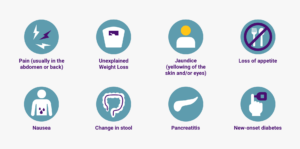What are the symptoms of pancreatic cancer?
Pancreatic cancer may cause only vague symptoms that could be confused with many other abdominal or gastrointestinal issues. It’s important to listen to your body and talk to your doctor about pancreatic cancer if you experience any of the following warning signs.
What are the symptoms of pancreatic neuroendocrine tumors (pancreatic NETs or PNETs)?
Pancreatic neuroendocrine tumors (PNETs) are rare, accounting for about 7 percent of all pancreatic tumors. PNETs may cause the pancreas to overproduce hormones. High levels of these hormones in the blood result in symptoms such as weight loss, nausea, vomiting, muscle weakness and skin rash. Learn more about the symptoms of pancreatic neuroendocrine tumors.
Abdominal Bloating (Ascites)
Ascites is the abnormal accumulation of fluid in the abdomen. This extra fluid causes the belly to become swollen and distended. Learn more about ascites.
Pain (Usually in the Abdomen or Back)
Pain in the upper abdomen or mid-back may be caused by the tumor pushing against or invading nerves or organs near the pancreas. Pain can also result if the tumor blocks the digestive tract. Learn more about pancreatic cancer-related pain.
Digestive Problems
Poor appetite, indigestion and nausea are common in people with pancreatic cancer. Some or all of these symptoms may occur when a tumor in the pancreas presses against the stomach or first portion of the small intestine. If this happens, food may remain in the stomach and cause several digestive difficulties, including nausea and vomiting. Digestive symptoms can also occur due to blockage of the pancreatic duct through which the pancreatic enzymes flow or due to changes in pancreatic enzyme production.
Jaundice
Jaundice is a yellowing of the skin and eyes caused by excess bilirubin (a component of bile) in the blood. A tumor in the head of the pancreas can cause narrowing of the bile duct and block the bile flowing from the gallbladder into the small intestine. Blockage of the bile duct causes a buildup of bilirubin. People with jaundice may also experience itchiness of the skin, abnormally dark urine and light or clay-colored stools.
Changes in Stools
Many pancreatic cancer patients experience diarrhea, constipation or both. Diarrhea consisting of loose, watery, oily or foul-smelling stools can be caused by insufficient amounts of pancreatic enzymes in the intestines. This leads to malabsorption as undigested food passes quickly through the digestive tract. Constipation is also a common problem, particularly in patients taking pain medications. These medications slow the passage of food through the intestines. If the digestive system works too slowly, it can cause stools to become dry, hard and difficult to pass.
Unexplained Weight Loss
Cancer-induced weight loss (also known as cancer cachexia) is a complex problem that affects the way the body uses calories and protein. Cancer cachexia can cause the body to burn more calories than usual, break down muscle and decrease appetite. A person may also notice a change in appetite or desire for certain foods.
Blood Clots
Cancer causes changes in the blood that can increase the likelihood of forming clots. Blood clots may go unnoticed and cause no symptoms. However, they are often associated with swelling, pain and tenderness in the affected area.
Diabetes
Diabetes is a condition in which the body does not make, or properly use, a pancreatic hormone called insulin. Insulin helps the body use glucose (sugar) efficiently. Research suggests that a sudden onset of type 2 diabetes in people age 50 or older may be an early symptom of pancreatic cancer, especially in those who have a low body mass index (BMI), experience continuous weight loss or do not have a family history of diabetes. A sudden change in blood sugar levels in diabetics who previously had well-controlled diabetes may also be a sign of pancreatic cancer. Learn more about diabetes and pancreatic cancer.
How do I alleviate these symptoms?
If you are experiencing any of these symptoms, it is important to bring them up with your doctor. Those who are diagnosed with pancreatic cancer can talk to their doctor about supportive (palliative) care to help relieve some of these symptoms.
We’re Here to Help
For more information about pancreatic cancer symptoms, symptom and side effect management or any other disease-related information, contact a PanCAN Patient Services Case Manager at 877-272-6226 or by completing our contact form. Case Managers are available M – F, 7 a.m. – 5 p.m. PT.
Related Topics
-
Diagnosis
See how pancreatic cancer is found, including tests done.
-
Risk Factors
Learn what makes people more likely to get pancreatic cancer.
-
Symptom Management
See how supportive (palliative) care can help lessen symptoms.
-
Ascites
Get information about abdominal bloating.
-
Diabetes and Pancreatic Cancer
Learn about diabetes, both a risk factor for and symptom of pancreatic cancer.






